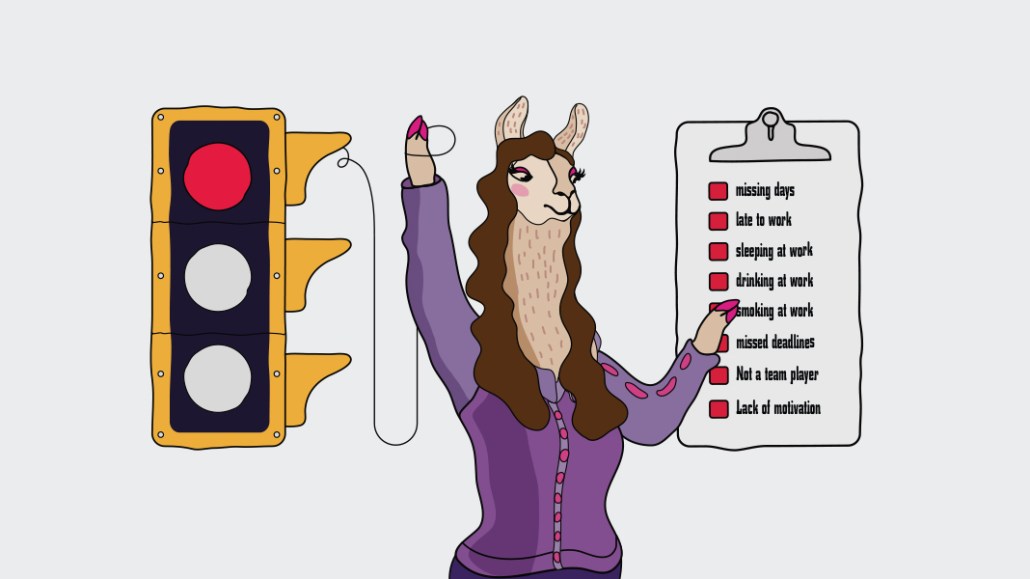
Hiring the right candidate has always been a challenge. But agencies are now competing for talent at a time when unemployment is low — and they are strapped for cash, grappling with extended payment windows and companies offering project work or taking marketing in-house. Sussing out who might be the best fit for a job depends a lot on the in-person interview. Digiday caught up with agency executives to find out their interview red flags — the signs of who’s not right to hire.
‘Jumpers’
My biggest red flags [are] related to how “jumpers” annotate their accomplishments on resumes. While I acknowledge that it’s natural in our industry to hop around, there are red flags in a candidates’ resume where they make claims to launching departments or growing businesses – all in less than a year. I believe it takes six months at least to get comfortable in any new job. So when I see candidates boasting solving or building something in such a short time, my alarm bells go off. — Gila Wilensky, Essence’s svp and head of media activation
Low risk-taking
When we recruit, we think in terms of “casting” versus filling a specific role, the intention being that just as when casting a play, you have to look at how the individual fits in with the other players as well as the overall narrative. In our case that narrative is about leading change versus following it. So a red flag for us is someone who seems to be married to a linear, obvious path, [who] isn’t comfortable with taking informed risks, or who doesn’t demonstrate interest about the broader economic and cultural issues that influence our clients’ business. —Stacy DeRiso, PHD’s U.S. COO
There is no ‘I’ in team
I ask each candidate, “What’s the best use of your time and talent at an agency like ours?” Most of the time, upon being asked that question, candidates will pause and say something along the lines of “Wow, no one has ever asked me that.” And then they will proceed to give a clear, thoughtful and true answer of how their specific talents could help us here, based on the research they’ve done. If a candidate launches into a prebaked, work-life history, I can tell right away they aren’t very nimble thinkers. If a candidate is an “I”-driven storyteller when it comes to relaying successes, it’s a pretty safe bet that collaborating ain’t their strong suit, which is a deal breaker in a creative-first agency. The candidates who don’t ask real-time (versus preplanned) questions let me know they are likely too rigid to be happy and successful in an environment as fast and iterative as ours. —Sue Gillan, OKRP’s chief talent officer
Lack of curiosity
Here’s my big interviewing “red flag”: I learn more about a candidate by listening to what they don’t say, as opposed to what they do say. My biggest red flag is [a] lack of curiosity in our agency and their career pathway. I love it when candidates ask me a ton of questions about the agency, [its] culture, the work and what their career pathway would look like at DNA. I look for candidates [who] are curious, humble and hungry to build on their careers.
—Charlene Short, director of talent and culture for DNA in Seattle
Evidence and hard data
The older I get, the more disloyal I am to my instincts. What I mean by that is that it’s not just about enjoying someone’s company and liking their resume. Evidence and hard data are key. I heard a speaker recently note that before hiring someone, it would be really valuable to see the candidate’s reviews by Uber drivers, for example. I love that idea. In an interview you want to challenge and probe to see what’s behind the words on a resume and make sure that the individual’s experiences match expectations. Of course, we look for some signs of the things we as a company hold dear — honesty, integrity, fairness, creativity, general open-mindedness and an interest … in the world.
—Joe Kelly, IPG’s svp of talent.
More in Marketing

WTF are tokens?
When someone sends a prompt or receives a response, the system breaks language into small segments. These fragments are tokens.

AI is changing how retailers select tech partners
The quick rise of artificial intelligence-powered tools has reshaped retailers’ process of selecting technology partners for anything from marketing to supply chain to merchandising.

YouTube’s upmarket TV push still runs on mid-funnel DNA
YouTube is balancing wanting to be premium TV, the short-form powerhouse and a creator economy engine all at once.








